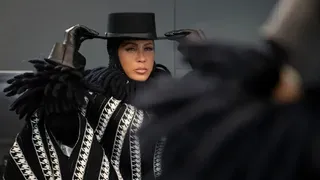January 26, 2017
Mary Tyler Moore Brought More Than Funny to Her Sitcom Roles
Frazier Moore READ TIME: 3 MIN.
It's a lot of meaning to heap on a pair of TV sitcoms. But there it is, as every fan of Mary Tyler Moore, past and present, understands: The two comedy series' that Moore helped catapult to legendary heights stand as something even greater than funny.
Sure, the funny was always indisputable. Moore, who landed the part of Laura Petrie on "The Dick Van Dyke Show" as an unknown, exceeded anyone's imagining with comic gifts she unleashed alongside well-established funnyman Van Dyke as husband Rob.
Moore, despite her beauty, didn't need to rest on good looks. That was well documented in the "Van Dyke" episode where, for the bulk of the half-hour, Laura wasn't seen, only heard from off-screen, after getting her toe stuck in the faucet while "playing with a drip" in a hotel bathroom's tub.
As Laura Petrie, Moore was America's sweetheart from 1961 to 1966.
Then, four years later, she did it again, making good on the claim by the theme song for "The Mary Tyler Moore Show" that, in her new role as career woman Mary Richards, she could "turn the world on with a smile." Not to mention make it laugh.
Those dozen years of timeless comedy are quite a legacy.
But Moore did more.
In those two series, she embodied an invaluable progression for how women were depicted on TV - and what they were seeking in real life. In both roles, Moore brought form and substance to what a modern woman in a changing world could be.
Neither Laura nor Mary was a revolutionary.
Laura was a stay-at-home wife and mother in the suburbs. But she had the self-assurance of a woman who had entered into marriage after entertaining military troops with her singing and dancing. Rob may have been the breadwinner, but he wasn't alone wearing the pants in the family (as evidenced by the fitted Capri slacks Laura wore so well).
And in a memorable episode, when a drunk accosted the Petries in a bar, Laura startled her husband by flipping the invader with a judo move. The unspoken message: When it counted, Laura could take care of herself - as well as her much-chagrined husband.
By the time "The Mary Tyler Moore Show" debuted in 1970, feminism was in full flower, and Mary Richards must have noticed.
Not that CBS was eager to be a trailblazer. It was too radical for Ms. Richards to be divorced when she set off for Minneapolis to answer the theme song's question, "How will you make it on your own?"
Instead, she was making her fresh start after a romantic breakup. But despite the song's insistence that "girl, this time you're all alone," Mary promptly found a home at TV station WJM, and with a circle of adoring friends.
She may have wanted a man, but that was no priority, and, to its infinite credit, the series never stuck her with a serious relationship. The unspoken message: Mary's life was plenty full without a man.
"The Mary Tyler Moore Show" never pretended that women had equal status to the opposite sex. Nor did Mary Richards think so.
She remained deferential to her gruff boss, Lou Grant, who no matter how long the show ran and how clearly she displayed her professional skills, she addressed as "Mr. Grant."
The premiere episode set the tone for bright-and-shiny Mary to be reminded, along with viewers up until the current day, that women don't always get a fair shake.
In her job interview, Grant (always played with sly perfection by Ed Asner) asked Mary her age. Then he asked her religion.
"Mr. Grant, I don't know quite how to say this," answered Mary with all the sweet defiance she could muster, "but you're not allowed to ask that when someone's applying for a job. It's against the law."
"Want to call a cop?" he shot back.
Of course, she didn't. She wanted the job, and she got it, along with a backhanded compliment.
"You know what? You've got spunk," said Grant, delivering one of the series' most-remembered laugh-lines: "I HATE spunk!"
But even Lou Grant, TV's most lovable male chauvinist, didn't hate Mary's spunk. And the audience savored it. Mary's brand of spunk was instructive and heroic, and still is.
With her death Wednesday at 80, Mary Tyler Moore could lay claim to many credits through her long career besides those two classic comedies.
But they were more than classic comedies. They helped point the way.







